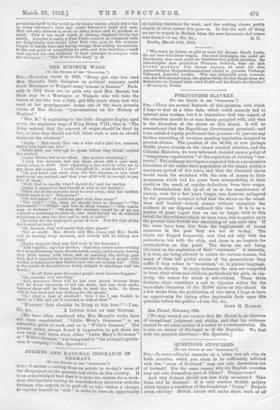PORTUGUESE SLAVERY.
[To m EDITOR OP THE "SPECTATOR."] Sin,—There are several features of this question, with which I hope to deal at a later date, which could scarcely fail to interest your readers, but it is imperative that one aspect of the situation should be at once firmly grappled with, and that is the liberation of the slaves on this island. It will be remembered that the Republican Government promised—and I am satisfied loyally performed that promise—to prevent any further recruiting of servicaes pending legislation designed to prevent abuses. The question of the 40,000, or now perhaps 30,000, slaves already on the island awaited solution, and the Colonial Ministers, we were informed, decided upon a policy of " compulsory repatriation " at the expiration of existing " con- tracts." The ordinary intelligence regarded this as a progressive liberation of the entire slave population of the island within a maximum period of five years, and that the liberated slaves would reach the mainland with the sum of money in their possession which had for years been accumulating to their credit as the result of regular deductions from their wages. The dissatisfaction felt by all of us at the maintenance of slavery, even for a few years longer, was, however, mitigated by the generally accepted belief that the slaves on the island were well treated—indeed, almost without exception the evidence at our disposal confirmed this view. It is to us a matter of great regret that we can no longer hold to this belief, for the evidence which we have been able to gather up to the present time forbids the cherishing of any such idea. If the rocas have been freo from the employment of brutal measures in the past they are not so to-day. The slaves are flogged frequently, and that not only with the palmatoria, but with the whip, and there is no loophole for contradiction on this point. The slaves are not being liberated on the expiration of their "contracts." A minority, it is true, are being allowed to return for various reasons, but many of these tell pitiful stories of the persecutions they suffer if they refuse to " recontract," or, in plainer language, remain in slavery. In many instances the men are compelled to leave their wives and children, particularly the girls, in cap- tivity, the reason for which is self-evident. These three features alone constitute a call to vigorous action for the immediate liberation of the 30,000 slaves on this island. In a few weeks from the publication of this letter I hope to have an opportunity for laying other deplorable facts upon this question before the public.—I am, Sir, &a,
JonN H. HARRIS. San Thome, February 29th.
[We may remind our readers that Mr. Harris is an observer of exceptional judgment and ability, and that his evidence cannot be set aside as that of a zealot or a sentimentalist. He is also no enemy of Portugal or of the Republic. We deal with the question elsewhere.—En. Spectator.]






































 Previous page
Previous page